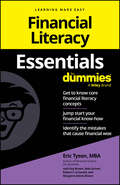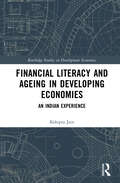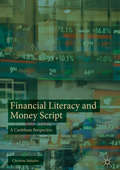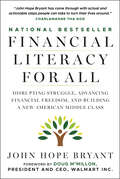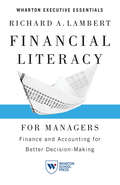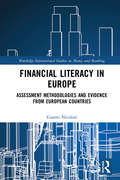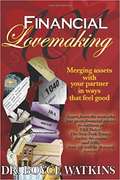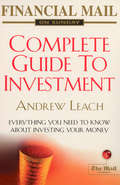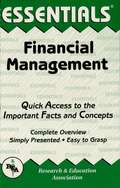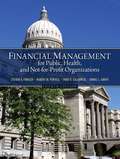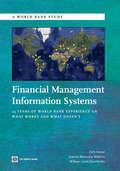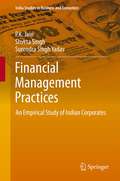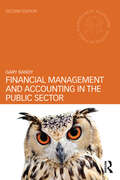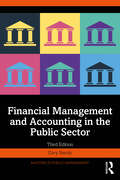- Table View
- List View
Financial Literacy Essentials For Dummies
by Eric TysonYour to-the-point guide on the essentials of managing your finances The first step in becoming a better personal financial manager is understanding the pillars of personal finance. Financial Literacy Essentials For Dummies is your cheat sheet on understanding how to better manage your finances. Distilled down to the essentials, this book makes it easy for anyone to learn the basics of managing money. You won't be able to escape life's many expenses, but with this book, you can get a grip on smart spending, saving, investing, and beyond. Start by creating a realistic budget for your situation and make a plan for achieving your goals. Money doesn't have to be scary with this Essentials guide. Get quick-and-easy explanations budgeting, savings accounts, and debt Understand how much you can really afford to spend, and learn to spend smarter Make a plan for getting out of debt—or avoid getting into debt in the first place Ensure that you have enough of a buffer to deal with unexpected expenses Need easy-to-understand information to help get your finances on track? Financial Literacy Essentials For Dummies is the guide for you.
Financial Literacy Strategies
by John Case Karen Berman Joe KnightIf your goal is to have a financially intelligent workplace or department, your first step should be developing a strategy for getting there. This chapter outlines three approaches that have proven effective in making financial literacy part of a company's culture.
Financial Literacy Strategies: For Entrepreneurs
by Karen Berman Joe KnightIn order to have a financially intelligent company, you must first figure out a strategy for getting there. This chapter outlines three approaches that have proven effective in making financial literacy part of a company's culture. This chapter is excerpted from "Financial Intelligence for Entrepreneurs: What You Really Need to Know About the Numbers."
Financial Literacy and Ageing in Developing Economies: An Indian Experience (Routledge Studies in Development Economics)
by Kshipra JainThis book weaves together current understanding around financial literacy and ageing, arguing for the relevance of financial literacy for old age security. Building upon on the experiences of ten developing Asian economies with a focus on India, the book enters new territory by developing frameworks that identify predictors of financial literacy and a mechanism for its internalization, as well as recognising the need for specialized training programs for the older population in order to establish a link between financial literacy and old age security. It thus makes a case about the centrality of financial literacy in creating an environment conducive to a dignified ageing experience in this world of shouldering one’s own responsibility. Going forward, the book comprehends financial literacy for India as a skill which enables an individual to decide the suitable avenues to invest savings, utilize monetary resources and shape financial decisions aligned with their financial goals, in accordance with the dynamic financial & economic environment. This original volume is a first-time attempt to provide an in-depth account of financial literacy and its association with savings behavior, old age planning, wealth accumulation, healthcare and wellbeing in older age. It also provides a detailed account of various measurement tools used and policy initiatives undertaken across the globe for financial literacy. It is an indispensable reference guide for scholars and researchers, cutting across multiple disciplines particularly financial and development economics, gerontology, demography, social work, psychology and public policy.
Financial Literacy and Corporate Performance
by John Case Karen Berman Joe KnightThis chapter discusses how financial intelligence empowers managers to make better decisions and contribute to a business's health, and advises organizations to take the next step and support the financial training of the entire staff.
Financial Literacy and Money Script: A Caribbean Perspective
by Christine SahadeoSince the financial crisis, everyone is more aware of the need to be financially literate. This book covers a wide range of topics and assures the reader that understanding of one’s money script and more particularly making changes (if necessary) would result in more effective and responsible managing and handling of one’s financial affairs. It is a misnomer that graduates of tertiary education are financially literate or are qualified to make financial decisions. In fact, they are particularly vulnerable in making poor financial decisions as many students do not undertake courses in financial education and they therefore have limited financial knowledge. Training in financial literacy through university-based financial education programs is one method of addressing personal finances and financial stress among students. This book presents the key components of financial education designed to address the growing concerns associated with high levels of debt, abuse of credit cards, home ownership, savings and investments, risk management, and retirement. The chapters on entrepreneurship and business planning provide a roadmap for successful new ventures. The book is an excellent resource for students, those interested in developing or enhancing their understanding of money matters and financial wellbeing, and trainers involved in financial education, counseling, and planning.
Financial Literacy for All: Disrupting Struggle, Advancing Financial Freedom, and Building a New American Middle Class
by John Hope BryantA new approach to understanding money and achieving financial fulfillment Former Vice-Chairman of the U.S. President's Advisory Council on Financial Literacy, John Hope Bryant, delivers an accessible and powerful resource for everyday Americans seeking to build a strong financial foundation. This book is an easy-to-read first step toward a fulfilling financial future, helping you understand your relationship to work and money, and a key component to untangling the surprisingly simple puzzle of personal finance. With an insightful forward by Doug McMillon, President and CEO of Walmart Inc., you'll learn how to create wealth for yourself and your family, regardless of your educational or employment background, and how to establish a financial mindset that contributes to a sound future. You'll also discover: The answers to tough money questions, including the actual utility of new financial inventions like cryptocurrency How to think about exchanging your time and effort for money and the conditions under which you should agree to work Plain-English discussions of the principles of responsible long-term investing and how it differs from speculation Acting as a critical pillar for those seeking to build a rock-solid financial foundation, Financial Literacy for All is a must-have book for working professionals, blue-collar workers, members of young families, and established businesspeople looking for a better, more secure future for themselves and the ones they care about.
Financial Literacy for Managers: Finance and Accounting for Better Decision-Making (Wharton Executive Essentials)
by Richard A. LambertThe language of businessIn order to understand how your business is performing right now and to evaluate, assess, and devise new strategies to boost future performance, you need information. Financial statements are a critical source of the information you need.In direct and simple terms, Richard A. Lambert, Miller-Sherrerd Professor of Accounting at the Wharton School of the University of Pennsylvania, demystifies financial statements and concepts and shows you how you can apply this information to make better business decisions for long-term profit. You will learn to use and interpret financial data; find out what we can learn from Pepsi, Krispy Kreme, General Motors, and other companies; learn how to evaluate investment strategies; and apply your financial know-how to develop a coherent business strategy.
Financial Literacy for Teens
by Chad FosterThe teen's guide to good financial habits at an early age - habits that will enable them to successfully make, manage, multiply, and protect their hard-earned money.
Financial Literacy in Europe: Assessment Methodologies and Evidence from European Countries (Routledge International Studies in Money and Banking)
by Gianni NicoliniAre people ready to take pivotal financial decisions like choosing a mortgage, saving for retirement, or investing their savings? How does the degree of knowledge about financial products and services affect the quality of their choices? Can financial fraud be prevented by increasing consumer financial knowledge? Financial Literacy in Europe addresses these important questions and more. In the first part, the author investigates the concept of financial literacy by analyzing its components and comparing different definitions from previous studies. This then forms a comprehensive measure of financial literacy to be applied in empirical studies that analyze the role of financial literacy in explaining consumers’ financial behaviors. In the second part of the study, the author uses brand new data collected by the Consumer Finance Research Center (CFRC) from several European countries (the UK, Germany, France, Italy, Sweden, and Spain) to assess financial literacy in Europe and highlight similarities and differences across countries. Filling an important gap in previous research, the author develops a rigorous approach in the measurement of financial literacy in order to examine European financial literacy issues in great detail. This book, therefore, is a useful resource for assessing the effectiveness of single financial education programs or planning national strategies on financial education. It can also support policy makers in developing financial regulation and consumer protection strategies, considering the consumer perspective and their ability to deal with financial markets and institutions.
Financial Literacy, Transparency, and Your Business's Performance: Why Entrepreneurs Should Bring Financial Intelligence to Work
by Karen Berman Joe KnightFinancial intelligence empowers entrepreneurs to make better decisions that contribute to a business's health, and support the financial training of the entire staff. Plenty of entrepreneurs have focused on developing financial intelligence and have found that the investment of time is repaid in productivity and employee satisfaction. This chapter is excerpted from "Financial Intelligence for Entrepreneurs: What You Really Need to Know About the Numbers."
Financial Lovemaking 101: Merging Assets With Your Partner in Ways That Feel Good
by Boyce WatkinsThis book teaches couples to use money as a tool to enhance their relationships, rather than as a weapon to destroy them. Dr. Boyce Watkins, a prominent Finance Professor who gives advice to millions through CNN, USA Today, Forbes Magazine and many other outlets, teaches couples to manage their money and strengthen their love, all at the same time. He teaches concepts such as getting financially naked with your partner, the art of financial foreplay, and reaching financial climaxes together. Reading this book will help you create the financial future you want, and maximize the love in your life.
Financial Mail on Sunday Guide to Investment
by Andrew LeachA unique, truly comprehensive guide to all aspects of investment, that provides a wealth of expert advice and information in clear and jargon-free language that everyone will understand. Part I - getting startedWhat are shares? How to buy and sell shares and what to expect in terms of returns? How to find a stockbroker that's right for you. How much money should you invest directly in shares? Lower-risk investments in bonds, gilts, and unit and investment trusts. Risk - and achieving the balance between risk and reward. Part II - understanding the jargonWhat do company results show? Some key financial yardsticks and how to calculate them. Key accounting issues and how the books can be cooked. Financial ratios and what they tell you. Part III - for the more experienced investorRisk and the psychology of investment. Some theories about markets and stock market investment. Key investment styles and the gurus of investment. Different types of investment opportunities. Futures and options. Commodities.
Financial Management Essentials
by Musa EssayyadREA's Essentials provide quick and easy access to critical information in a variety of different fields, ranging from the most basic to the most advanced. As its name implies, these concise, comprehensive study guides summarize the essentials of the field covered. Essentials are helpful when preparing for exams, doing homework and will remain a lasting reference source for students, teachers, and professionals. Financial Management includes the finance function, business organization, financial statements, depreciation and cash flow, financial statement analysis, financial planning, operating and financial leverage, time value of money, risk and return, valuation, capital budgeting, cost of capital, capital structure, cash and marketable securities, accounts receivables and inventories, and financing smaller firms and startups.
Financial Management For Public, Health, And Not-for-profit Organizations
by Steven A. Finkler Thad Calabrese Robert Purtell Daniel L. SmithOne of the few texts that addresses financial and managerial accounting within the three major areas of the public sector. Financial Management for Public, Health, and Not-for-Profit provides the fundamentals of financial management for those pursuing careers within the public, health and not-for-profit fields. With a unique presentation that explains the rules specific to the public sector, this book outlines the framework for readers to access and apply financial information more effectively.
Financial Management Information Systems
by The World BankSince 1984, the World Bank has financed 87 Financial Management Information System (FMIS) projects in 51 countries totaling over US $2.2 billion, of which US $938 million was for FMIS related information and communication technology (ICT) solutions. This study presents the World Bank's experience with these investment operations to share the achievements and challenges observed, and provide guidance for improving the performance of future projects. The report is structured according to four overarching questions: * What historical patterns emerge from World Bank financed Treasury/FMIS projects? This includes an analysis of project scope, cost, duration, design, objectives, and ICT solutions, among other aspects. * How have such projects performed according to various criteria? * What are the key factors that contribute to the success and failure of projects? * What have we learned that could be useful for future projects? The findings of this report are primarily based on the 2010 FMIS Database, which includes 55 closed and 32 active FMIS projects implemented between 1984 and 2010 (7 pipeline projects are also analyzed in some sections). The data was gathered primarily from internal World Bank documents and sources, and complemented with interviews with project teams. The Database contains a rich set of operational data and performance ratings for the benefit of the World Bank task teams, government officials and other specialists involved in FMIS projects. Compared to the previously prepared draft FMIS report in 2003 (Dorotinsky and Cho), this study is based on a broader set of projects and documents in analyzing the performance and outputs of the FMIS projects, and presents more in-depth analysis of the success and failure factors. Based on the findings of the current study, the interventions of the World Bank in the design and implementation of FMIS solutions have been reasonably successful in most countries.
Financial Management Practices
by Shveta Singh P. K. Jain Surendra Singh YadavFinancial management practices are likely to have a marked effect on the financial performance of a corporate enterprise. Therefore, sound financial decisions/practices can contribute towards meeting the desired objective of having profitable operations. This subject assumes paramount significance in view of the present dynamic and turbulent business environment, which has produced more intense competition and smaller profit margins across the world. In this context, the financial management practices of the corporates in India, a country with a vast potential for economic growth, can offer valuable insights. The present study explores whether there has been a major change in the financial performance (measured in terms of profitability) and financial policies/decisions of the sample companies over a fixed period (2000-2001 to 2010-2011), with a special focus on pre and post-recession analysis. It delves deeper into current research areas such as zero working capital, real options in capital budgeting, pecking order in capital structures, and clause 49 as reflected in the financial management decisions of sample companies, and provides a broader perspective by identifying trends (if any) in certain aspects of financial decision-making over the past two decades. A comprehensive study, covering all the major aspects of financial management practices, also contains an inter-sectoral study (among the sample companies) and develops an index of professionalism in financial management based on the practices of the sample companies. The book is primarily targeted at teachers/students of finance, management, commerce, accounting and related professional disciplines/fields. Practitioners/professionals will find it an invaluable text that helps guide them to better decision-making.
Financial Management Practices in India
by Sandeep GoelEfficient financial management is the essence of business. This book analyses and evaluates core financial management practices of corporate enterprises in India across diverse sectors including realty, FMCG, pharmaceutical, automobile, IT, chemical and BPO sectors. It emphasizes the importance of the integrated process of capital investments, financing policy, working capital management and dividend distribution for shareholders for a developing economy as India. It further highlights the need for financial viability both in totality and segmental performance. The volume also offers a comparative study of the practices of the companies in different sectors to allow a better appreciation of the issues and challenges regarding management of finances. Rich in case studies, this book will be an indispensable resource for scholars, teachers and students of financial management, business economics as also corporate practitioners.
Financial Management Revised Edition
by ElearnStuck for ideas, inspiration or just want to work differently? Management Extra brings all the best management thinking together in one package. The books are practical and well structured to provide an in depth treatment of these management topics. Titles in the series: * Business Environment * Change Management * Development for High Performance * Effective Communications * Financial Management * Information and Knowledge Management * Leadership and Management in Organisations * Leading Teams * Making Sense of Data and Information * Managing Markets and Customers * Managing for Results * Managing Health, Safety and Working Environment * Managing Legal and Ethical Principles * Managing Yourself * Positive Working Relationships * Project Management * Quality and Operations Management * Reaching Your Goals Through Innovation * Recruitment and Selection * Reputation Management The series fuses key theories and concepts with applied activities to help managers examine how they work in practice. The books are created with individuals in mind. They are designed to help you improve your management skills. Management Extra can also be used in conjunction with management programmes of study aligned to standards. Each of the books has case studies, self assessments and activities all underpinned by knowledge and understanding of the frameworks and techniques required to improve performance. Management Extra provides managers and trainers with a handbook for action and development. "You found it – what a find! A practical resource packed with all the relevant theory and suggested activities to support your professional development. An essential resource to have at your fingertips, jump in and enjoy." --Russell Jeans, Learning and Development Manager, ntl "All the essential concepts are here, presented in an easily digestible format with lots of up to date case studies and references – but, most importantly, with plenty of thought provoking activities and self-diagnostic exercises to make the learning personal and transferable." --Peter Manning, Head of Training & Development, News International Newspapers Ltd
Financial Management Strategies for Hospitals and Healthcare Organizations: Tools, Techniques, Checklists and Case Studies
by David Edward Marcinko Hope Rachel HeticoIn this book, a world-class editorial advisory board and an independent team of contributors draw on their experience in operations, leadership, and Lean managerial decision making to share helpful insights on the valuation of hospitals in today‘s changing reimbursement and regulatory environments.Using language that is easy to understand, Financia
Financial Management and Accounting in the Public Sector (Masters in Public Management)
by Gary BandyThe impact of the global financial crisis on government funds has been significant, with squeezed budgets having to satisfy ever-increasing demands for public services. Managers working in the public sector are confronted daily with targets and demands that are often set in confusing accounting and financial language. In Financial Management and Accounting in the Public Sector, Gary Bandy employs a clear and concise narrative to introduce the core concepts of accounting and financial management in the public sector and how to deliver services that represent value for money. This second edition has been revised and updated throughout, offering: an increased focus on post-crisis austerity more international examples of public financial management greater coverage of governance, accountability and risk management With a glossary of terms to help managers understand and be understood by accountants, as well as learning objectives, case studies and discussion questions, this practical textbook will help students of public management and administration to understand the financial and accounting aspects of managing public services.
Financial Management and Accounting in the Public Sector (Masters in Public Management)
by Gary BandyThe importance of public financial management for the health and wellbeing of citizens became dramatically apparent as governments sought to respond to the coronavirus pandemic in 2020. Now, governments and other public sector organizations face the challenge of recovering from the pandemic whilst also seeking to achieve Sustainable Development Goals, with squeezed budgets and ever-increasing demands for public services. Public sector managers are confronted daily with targets and demands that are often set in confusing accounting and financial language. In Financial Management and Accounting in the Public Sector, Gary Bandy employs a clear and concise narrative to introduce the core concepts of public financial management to help those managers to deliver programmes, projects and services that are value for money. As the author puts it, managing public money is an art, not a science. This third edition has been revised and updated throughout, offering: a structure that is more clearly linked to the stages of the public financial management cycle greater coverage of transparency and accountability issues a broader view of public procurement to include goods, works and services and effective contract management; and an increased focus on public spending in the context of a post-COVID environment. With a glossary of terms to help managers understand and be understood by accountants, as well as learning objectives, discussion questions and exercises, this practical textbook will help students of public management and administration to understand the financial and accounting aspects of managing public services.
Financial Management and Control in Higher Education
by Eric Morgan Malcolm ProwleFull of tried and tested case material, examples and useful illustrations, this book considers the latest developments and covers all levels of financial management from the structure of the management of institutions right down to the course level and managing budgets.
Financial Management and Corporate Governance from the Feminist Ethics of Care Perspective
by Desi Adhariani Nick Sciulli Robert CliftThis book investigates how businesses can adapt their executive and fiscal practices to adopt an ethical, equal-opportunity approach. The authors demonstrate how corporations can create sustainable work environments that embrace feminist care ethics and ground their research in a strong theoretical discussion of this relatively new framework. The discussion has a multidisciplinary outlook and explores how the concept of care ethics might be successfully applied to various professional contexts. Later chapters present findings from an empirical case study conducted in Australia and use both qualitative and quantitative methods to analyse the potential power of a feminist care of ethics approach within commercial and corporate management.
Financial Management and Corporate Governance from the Feminist Ethics of Care Perspective
by Desi Adhariani Nick Sciulli Robert CliftThis book investigates how businesses can adapt their executive and fiscal practices to adopt an ethical, equal-opportunity approach. The authors demonstrate how corporations can create sustainable work environments that embrace feminist care ethics and ground their research in a strong theoretical discussion of this relatively new framework. The discussion has a multidisciplinary outlook and explores how the concept of care ethics might be successfully applied to various professional contexts. Later chapters present findings from an empirical case study conducted in Australia and use both qualitative and quantitative methods to analyse the potential power of a feminist care of ethics approach within commercial and corporate management.
